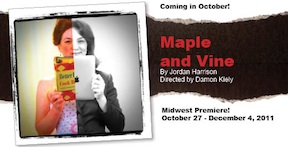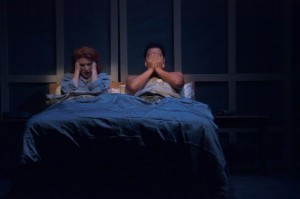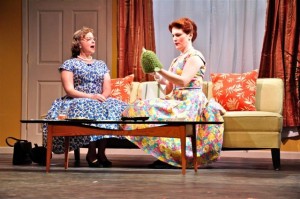PROMISING PREMISE PRODUCES
PREPOSTEROUS PRODUCT
Katha and Ryu are a modern married couple fed up with their harried lives: Ryu hates his 60-hour workweeks as a doctor and Katha is discontented with her job in front a computer screen. Plus, she is drenched in depression following a miscarriage.
Katha accidentally meets well-groomed, mild-mannered, and middle-aged Dean, a man who lives in a gated community within the contemporary city — a population which is entirely dedicated to living life as it was in the mid-fifties. Katha and Ryo are tempted by Dean’s vision of a simpler, happier life in the era of Ozzie and Harriet, when clear-cut gender roles defined women as homemakers and men as breadwinners, so the couple walks away from their 2011 life and joins the re-enacted world of 1955.
Under the mentoring of Dean and his ostentatiously agreeable wife Ellen (the leaders of the community), Katha and her Japanese-American husband placidly adjust to their new world where residents are expected to go the whole hog in transferring back to the mid 1950s. There is a standing committee of authenticity to ensure that the lifestyles don’t wander beyond 1955: all synthetic fabric clothing has to be discarded and Grey Goose vodka is out, yet Smirnoff is fine. Although electronic gadgets and other forms of social networking are out of bounds, Dean keeps a cell phone locked in a drawer for emergencies — a concession to modern times.
That’s the intriguing narrative premise in Jordan Harrison’s new play Maple and Vine, opening the 2011-2012 season at the Next Theatre.
The play’s concept can go several ways: it can be a fantasy in the Twilight Zone mode, it can be an exercise in nostalgia along the lines of Back to the Future, or it can take a darker path into social criticism, playing off the “good old days” against today’s technology-obsessed society. Maple and Vine flirts with all three but never settles on a clear line. The audience likely will be unsure where the play wants to take them.
By intermission, Harrison’s play seemed like a one-joke comedy drama that had no place to go, but in the final act, Harrison injects a couple of plot devices to intensify the action. We learn that Dean is gay and is having a passionate affair with Roger, Ryu’s boss at the box factory where he has been assigned a menial job. Ryu is also subjected to blatant racial abuse because of his Japanese background. Homophobia and racism are openly accepted, even encouraged in the community, suggesting that those “good old days” weren’t so good after all.
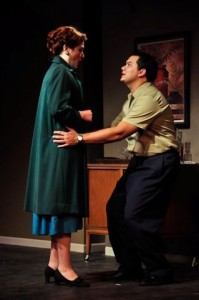 By the end of the play, Dean and Roger have fled together into the real world where presumably they can live together in the more enlightened 2011. But Katha and Ryu have settled in nicely in their 1955 environment. Katha even has a baby and has usurped Ellen’s leadership role in the community following Dean’s abandonment. Katha even insists that the residents accelerate their intolerance toward her husband in keeping with the authentic racist spirit of the time.
By the end of the play, Dean and Roger have fled together into the real world where presumably they can live together in the more enlightened 2011. But Katha and Ryu have settled in nicely in their 1955 environment. Katha even has a baby and has usurped Ellen’s leadership role in the community following Dean’s abandonment. Katha even insists that the residents accelerate their intolerance toward her husband in keeping with the authentic racist spirit of the time.
Taken realistically, Maple and Vine tells a preposterous story. It’s inconceivable that a community could exist as an island of historical purity within a large modern city. And the picture of the 1955 as all I Love Lucy and “I Like Ike” stacks the deck toward wholesomeness, knowing that the period also included the young Elvis Presley and the counterculture Beat Generation. The passionate homosexual affair between Dean and Roger comes out of nowhere in the second act and doesn’t connect with anything else in the story. Katha’s encouraging the community to step up its racial attacks on her husband stretches audience credulity beyond the breaking point.
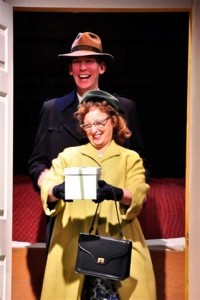 The play succeeds best at the comic level, with back and forth contrasts between the lifestyles of today versus 1955. Those contrasts provide easy, comfortable laughs, especially for spectators of a certain age who recollect the fashions and slogans of the 1950’s. It isn’t very deep, but it’s entertaining.
The play succeeds best at the comic level, with back and forth contrasts between the lifestyles of today versus 1955. Those contrasts provide easy, comfortable laughs, especially for spectators of a certain age who recollect the fashions and slogans of the 1950’s. It isn’t very deep, but it’s entertaining.
I suspect that the playwright had serious matters in mind beneath the play’s humor, but if so, they need clarifying. (An equally exciting premise had Harrison take us to a futuristic world where print is dead in Futura.) Maple and Vine premiered at the 2011 Humana Festival, where it created something of a stir, so we may be witnessing a work in progress that will be improved by firming up its talking points. Is the present time an impersonal age shorn of human contact as we allow electronic gadgets to do our communicating for us? Or are we more advanced today than in the 1950s, once we cut through the seductive haze of nostalgia that suggests a less complicated, thus better time? Such questions are worth exploring, and the playwright may feel he’s addressing them, but the script lacks focus. It will be interesting to see what New York’s Playwrights Horizons does with the piece, now that it has been added to the company’s 2011-2012 season.
The play is staged as a series of short scenes where characters (along with stagehands dressed in the style of the 1950’s) slide panels back and forth to change scenes. The five-member cast is led by Molly Glynn as Katha and Jenny Avery as Ellen. The two female characters are the sturdiest and most interesting people in the story, and Glynn and Avery bring them alive nicely. Lawrence Grimm (Dean), Paul D’Addario (Roger) and Peter Sipla (Ryu) do what they can with the less rounded male characters.
The first act meanders, but that may be more the script than the direction of Damon Kiely. Keith Pitts designed the sets and Alex Meadows designed the historically authentic costumes. Lindsay Jones is the sound designer and Diane Fairchild designed the lighting.
photos by Manny Ortiz
Maple and Vine
Next Theatre in Evanston
ends on December 4, 2011
Next Theatre closed its doors in 2014
for more shows, visit Theatre in Chicago
